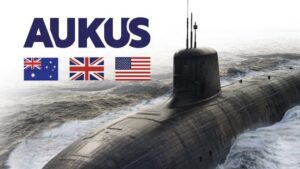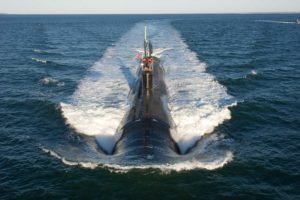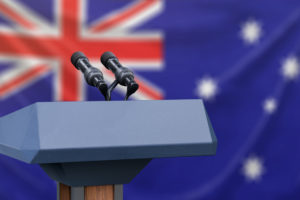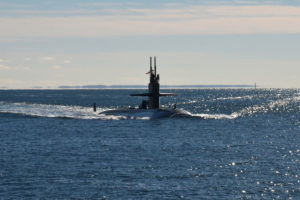At the launch of the new AUKUS partnership on 15 September 2021, it was clear that the leaders of the United Kingdom, Australia, and the United States all understood that the project would be exceptionally demanding and carry substantial risk. Reflecting on the plan to deliver the Australian navy a ‘pathway’ to acquire nuclear-powered submarines, Boris Johnson, the then-British prime minister, said, ‘This will be one of the most complex and technically demanding projects in the world, lasting for decades and requiring the most advanced technology.’ In the iconic British political satire, Yes Minister, senior civil servant Sir Humphry Appleby often warned his hapless political boss, Minister Jim Hacker, of the dangers of making ‘courageous’ decisions. In recent decades, few political decisions between allies have been as courageous as AUKUS.
In this brief paper, I set out what might happen to derail the good intentions of AUKUS policymakers. My aim is not to try to sink AUKUS so much as to help make the project watertight against the many risks that will circle the project in the coming years. For the three parties, a failure of AUKUS would be highly damaging. If the grouping were unable to deliver on at least some of the planned technological collaboration, it would weaken Washington’s credibility as the essential protector of the global security order and undermine alliance interests in the Indo-Pacific and Europe. For Australia in particular, with a darkening strategic outlook and the closest of alliance relationships with the United States, a failure of AUKUS would probably lead to electoral defeat for the government of the day and a drastic rethink of defence policy settings. From a United States perspective, a failure of AUKUS to deliver would damage the credibility of the Biden Presidency’s approach to the Indo-Pacific and undermine the alliance relationship with Australia, a vital partner in the region.
We should start, though, by considering the positive factors that help create the basis for AUKUS’ success. None of the involved parties signed up to the agreement without considering the risks and deciding that the advantages coming from success would be worth a huge intellectual and financial commitment. A clear strength of AUKUS is that the political leadership of the three countries have publicly and regularly committed to the project, notwithstanding that Australia and the United Kingdom have both seen changes of Prime Minister in 2021. AUKUS is a substantial enough undertaking for both countries that the costs of ceasing to support the arrangement would be unattractive to any prospective Government and a step not taken lightly. They now need to deliver success or face the difficult political and strategic consequences of failure. Top-level political backing for AUKUS is a major driver of official-level effort to deliver on the program. As we shall see, though, a major consideration will be for that political priority to be maintained through the inevitable changes of presidents, prime ministers, and ruling parties over the multi-decade life of the agreement.
A second AUKUS strength is that no three countries are more used to cooperating with each other and doing so successfully in highly sensitive areas of intelligence, military interoperability, and combat operations. There is an organic level of trust between the AUKUS partners based on similar value systems, substantially shared strategic outlooks, and a long track record of prior cooperation. To be sure, there are often areas of political difference and a history of spatting over defence and security choices, but a measure of the closeness between the three parties is their ability to manage differences mostly amicably. One might venture to say that no other combination of three countries would have a better chance of delivering success over such an ambitious technology agenda.
A third motivator is the strategic outlook and the emerging sense of a clear and present danger coming from an aggressive People’s Republic of China (PRC). The AUKUS partners have each hardened their strategic judgments about the threat presented from Beijing. As recently as six or seven years ago, AUKUS governments entertained the hope that the PRC could be persuaded to accept the current international strategic order and that mutually beneficial economic cooperation would overside evident security differences. That hope has largely disappeared. It has been undermined by Beijing’s aggression abroad, its open hostility to the international rules-based order, and China’s espionage and intellectual property theft. The PRC’s hardening authoritarianism and militant nationalism directed against any country that refuses to accommodate Beijing’s objectives leaves no options for the United States and its allies to push back. Although AUKUS is primarily a technology, science, and industrial partnership, its strategic purpose, as President Biden expressed it, is ‘to address both the current strategic environment in the region and how it may evolve. Because the future of each of our nations—and, indeed, the world—depends on a free and open Indo-Pacific enduring and flourishing in the decades ahead.’ In short, AUKUS is a backs-to-the-wall response to an immensely serious threat. The role of AUKUS is to shore up the position of the United States and its allies in the Indo-Pacific at a time when the balance of power in the Indo-Pacific is changing.
What might bring about the demise of AUKUS? A Brookings Institution report in 2010 analysed 63 major alliances over the past 500 years and found that only ten of those partnerships lasted for 40 years or longer. The ‘survivors’ include NATO and ANZUS. The Brookings analysis judged that alliances come to an end for four key reasons: an alliance partner is defeated in conflict or ‘ceases to exist in its joining condition’; the interests of alliance partners diverge; the threat disappears; or a partner fails to abide by a core alliance principle.
AUKUS is not a treaty-based alliance and was described by President Biden at its launch as ‘a new enhanced trilateral security partnership.’ Nonetheless, the grouping adds to the already-close alliance machinery binding the Australia and the United Kingdom with the United States. Could AUKUS fail for any of Brookings’ four cited reasons? One can never rule out the risk of an AUKUS partner being defeated in conflict. Moreover, with a large conventional war in Europe and an increasingly aggressive and nationalistic PRC, the risks of large-scale war are unquestionably greater. The defeat of an AUKUS partner in a major conflict would signal a fundamental shift in the global strategic balance; in the current context, that would mean an authoritarian power rising to dominate Europe or the Indo-Pacific. AUKUS was created to help prevent such an outcome, the prospects of which remain dire but imaginable.
Could the interests of the AUKUS partners diverge? Again, this is possible to imagine. A United States that reverts to unhappy isolationism, an Australia that opts for subservient neutrality to appease the PRC, a Britain that gives up a global posture to focus solely on its troubled European neighbourhood—these are all strategic postures that have their enthusiastic advocates. But these outcomes contradict current policy approaches and, indeed, the historical strategic dispositions of the AUKUS countries.
Will the threat disappear? That seems unlikely given current trajectories of Russia and China. These countries have embarked on a sustained critique of the international order as established by the post-World War II democracies. Moscow and Beijing seek to reshape that strategic order to benefit their authoritarian systems. It is possible that regime change might create political leaders more open to rapprochement with the democracies, but that seems unlikely given Putin and Xi’s grips on power. Nor can we assume that any successors would be more open to cooperation. For the foreseeable future, the threat from these regimes will remain and, most likely, grow.
Brookings’ fourth historical alliance killer is that a partner fails to abide by a core alliance principle. Could that happen to the AUKUS partners? Well, this is how New Zealand effectively ceased to be an active partner of the ANZUS alliance in the early 1980s, when an anti-nuclear New Zealand Labour Government denied port access to a U.S. Navy vessel because it could not determine if the ship carried nuclear weapons. In 1986, Washington responded by suspending its ANZUS alliance commitments to Wellington. The lesson is that alliance members can, at times, fail to live up to what partners perceive to be core principles. The possible complexities of tripartite defence capability development projects carried out under AUKUS certainly carry the risk that key principles might be breached. It will take careful management to make sure all parties stay the course.
On balance, and taking into account the longevity of NATO and the Australia-U.S. component of ANZUS, the AUKUS partnership has every prospect of becoming a long-lasting partnership. The closeness of the three countries and looming threats from authoritarian regimes suggest that cooperation will be sustained.
Perhaps the most testing moment for AUKUS will happen around March 2023. This is when officials from the three countries must bring to their political leadership recommendations on how to deliver a nuclear-powered submarine fleet for Australia. AUKUS addresses a wide array of technology applications, including hypersonics and quantum computing, but the most immediate priority is to define the pathway for the Royal Australian Navy to acquire nuclear-propelled submarines (SSNs). Australia’s Defence Minister and Deputy Prime Minister Richard Marles wants to deliver three outcomes in March 2023: First, to identify a submarine type—in effect, the U.S. Virginia-class or British Astute-class SSNs, or their design successors. Second, to establish a timeframe for the acquisition. Third, Marles says he wants options for an interim conventional submarine replacement if there is a gap between the end of life of the Collins-class submarines and the arrival of the SSNs.
There has been an intense effort by officials to develop options for the AUKUS governments for the March 2023 timeframe. An Australian Nuclear Powered Submarine Taskforce has been working with British and American counterparts to address ‘submarine design, construction, safety, operation, maintenance, disposal, regulation, training, environmental protection, installations and infrastructure, industrial base capacity, workforce, and force structure.’ Each of these areas present potential stumbling blocks to the successful delivery of a nuclear-propulsion pathway.
When it comes down to it, March 2023 presents a moment for the three AUKUS leaders to decide if they are confident enough to proceed with the nuclear-propulsion pathway. From a U.S. perspective, President Biden must be assured that Australia is fully committed to the project, is prepared to spend the enormous sums of money required, and can fully address the safety and operational requirements needed to run SSNs. Perhaps most importantly, the United States will want Australia to demonstrate that it can satisfy U.S. Navy and Department of Energy requirements to secure the physical and intellectual property around nuclear propulsion. As close as the two countries are, the United States will still make tough independent judgments, as it should, about Australia’s capacity to step-up as a nuclear partner.
For Australia’s part, Prime Minister Anthony Albanese will be looking for assurances that the Defence Organisation working with allies and industry really can deliver on an immensely complicated project. To be candid, Australia’s track record on submarine design and production has been patchy. The new Labor Government, perhaps unwisely, re-committed to building the SSNs in Adelaide, South Australia. This will take a huge step-up in Australian industrial capability.
Then there is the cost. The project to build French-designed conventional submarines had an ‘out turned’ cost (taking account of inflation) estimated at between AUS$80 to $90 billion over the submarines’ life. The best public estimate of the SSN project amounts to an out-turned cost that will be between AUS$153 billion and $171 billion. These figures do not include the costs of operating the submarines, nor the multi-billion dollar cost to construct a new naval base for the SSNs on the east coast of Australia. Albanese can be expected to suffer some sticker shock at these costs, a large proportion of which are not factored into current defence spending levels. Beset with many funding priorities and a large COVID-related national debt, it is possible that an Australian government might baulk at the cost of the project. Albanese may also reflect on the reality that the project will not deliver Australian-built submarines until well into the 2030s. The project does little to help the government deal with a much more immediate challenge to the regional security order from Beijing.
Britain’s position on the SSN element of AUKUS is largely driven by how it can maximise its industrial benefit where its submarine-building capability is already substantially committed to the Royal Navy’s own future capability priorities. AUKUS is valuable to London if it makes the UK more central to American strategic thinking. Meanwhile, the relationship with Australia helps boost Johnson’s policy of a ‘Global Britain’ making a ‘tilt to the Indo-Pacific’. Newly appointed UK Prime Minister Liz Truss will continue Johnson’s foreign and defence policy approach, but the war in Ukraine underlines the point that an emphasis on the Indo-Pacific is, in truth, a second-order priority for UK security.
The worst outcome for AUKUS in March 2023 would be if the United States, doubting Australia’s capacity to deliver, or Australia, baulking at the cost, decides not to proceed with the SSN project. An un-telegraphed outcome like that would damage both countries’ international position. More likely, if either Canberra or Washington thought the March deadline was pointing to a ‘no-go’ on SSNs, it might be possible to pre-agree on an outcome whereby the submarine project is put to one side so that the partners can focus on other technology possibilities. A decision to prioritise delivering existing military capabilities in the nearer term would be publicly saleable given the current strategic outlook.
The outcome that officials are working to, of course, is to find the pathway to providing Australia with nuclear propulsion. What is to be hoped here is that 18 months of preparatory work will make it possible for the three national leaders to give full-throated endorsement to the project, directing their officials to make all haste in delivering a tangible outcome. The worst of all worlds would be an overabundance of caution resulting in more exploratory work being commissioned that could lead to disappointment in years to come. Officials need to rigorously pursue areas of concern and ensure that a drive to deliver a positive outcome doesn’t create a ‘conspiracy of optimism’ where a flawed plan is endorsed only to produce a failed project years later.
The AUKUS countries have much to lose by being half-hearted or overly cautious. Success needs to be charged at. Alternately, if any one AUKUS party looks likely to deliver a ‘no-go’ on SSNs, a pre-agreed pragmatic refocusing onto more deliverable technology will help to save face while still allowing the wider AUKUS agenda to be developed.










